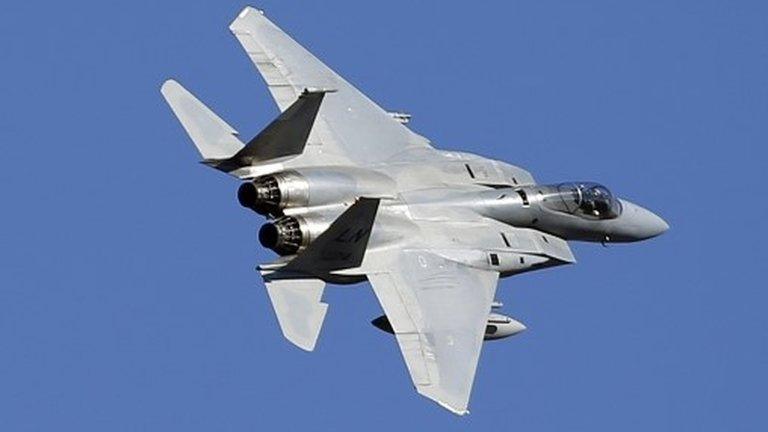Russian air force planes test Nato defences
- Published
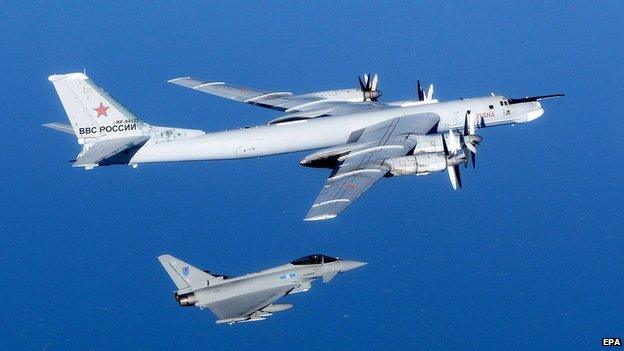
An RAF Typhoon jet intercepting a Tu-95 Bear bomber north of the UK (pic from 16 Sep 14)
Russian warplanes are carrying out more flights in European airspace to test Nato responses and apparently imitate combat conditions, an expert says.
Igor Sutyagin told the BBC that the Russian pilots' lack of communication with air traffic controllers was "unfriendly" and "confrontational".
"They are training in conditions close to combat," said Mr Sutyagin, of the Royal United Services Institute (RUSI).
Nato says there has been an "unusual" increase in such flights this week.
Tensions between Russia and Nato states have soared over the Ukraine crisis.
"The Kremlin is playing from a position of weakness," Mr Sutyagin said. "It's like poker, bluff - trying to intimidate the West and raise fears."
A Nato statement , externalon Wednesday said that in the past 48 hours Nato jets had intercepted eight Russian military aircraft over the North Sea/Atlantic Ocean, as well as four over the Black Sea and more than 10 in the Baltic region.
In all the incidents the Russian planes flew in international airspace. Nato says it tracked them "in order to identify the aircraft and protect Allied airspace".
But in many cases the planes did not file flight plans, nor did they use on-board transponders or maintain radio contact with civilian air traffic control, Nato said.
Such behaviour created a risk for civilian aviation, Nato said.
Nato interception of Russian aircraft - 29 October 2014
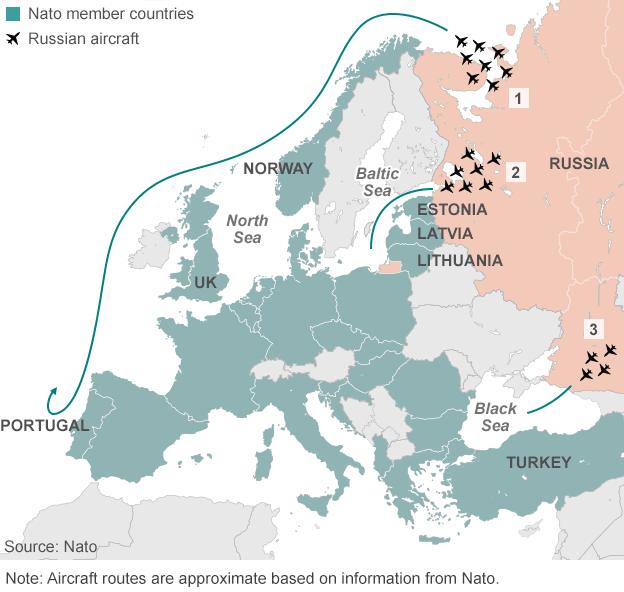
1) Eight Russian aircraft - four Tu-95 strategic bombers and four Il-78 tanker planes - detected flying over the North Sea at 02:00 GMT on 29 October. Two bombers continued south-west all the way to Portuguese coast before turning round
2) At least seven Russian aircraft detected over Baltic Sea and intercepted by fighter jets assigned to Nato's Baltic Air Policing Mission
3) Four Russian aircraft flying over Black Sea intercepted by Turkish Air Force
Baltic tensions
According to Mr Sutyagin, such flights close to Nato borders are "nothing new" but their current intensity and the lack of communication "should be taken in the context of Russian policy - aiming at confrontation with the West, not co-operation".
The Baltic is also a busy area for international flights, he noted, so the pilots' failure to communicate there could be seen as "irresponsible".
Nato has stepped up its air patrols over the Baltic states - Estonia, Latvia and Lithuania - in response to the Ukraine crisis.
The Kremlin regards the states' incorporation into Nato in 2004 as an unfriendly act, as they used to be part of the Soviet Union and about a million ethnic Russians still live there.
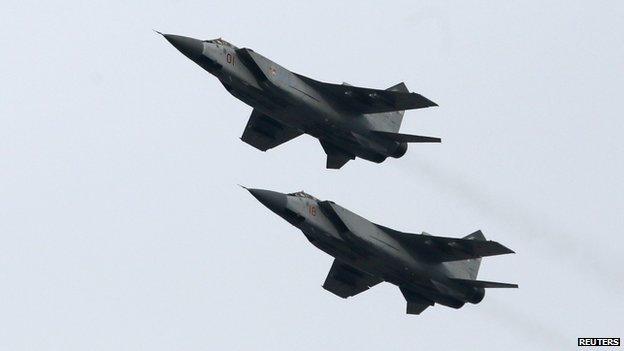
The Russian aircraft flying over Europe are said to include types of MiG-31
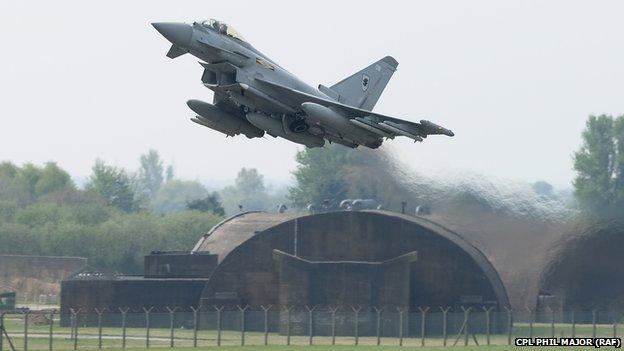
Four British Typhoon jets are in Lithuania participating in Nato air patrols
Poland has also announced plans to deploy extra forces at its eastern bases, closer to Ukraine.
Western governments accuse Russia of having fomented the pro-Russian revolt in eastern Ukraine and of arming the rebels there.
Nato said it had intercepted Russian aircraft more than 100 times so far this year - three times more than it did last year.
There is speculation that the tensions could push Finland and Sweden into joining Nato.
Russia has used a mix of old and new planes in the latest flights. They include Tu-95 Bear bombers - dating back to the Cold War era - and MiG-31 fighters.
The Bear was a familiar sight over the North Sea during the Cold War.
Russian bombers can be armed with cruise missiles, but they are probably using dummy missiles on these flights, Mr Sutyagin said.
"It is good practice for them - to see what happens, testing reaction times, who scrambles, how fast, from where, and the interception tactics," he said.
Unlike the US military the Russian air force does not yet have Stealth jets invisible to radar, he said, but it does have six undergoing trials.
Arctic reinforcements
Russian President Vladimir Putin has announced new military deployments in the Arctic region, where Russia is developing major new oil and gas fields.
A permanent naval base is being set up on the New Siberian Islands.
The region is attracting international interest because the melting of Arctic sea ice is likely to make the Northern Sea Route more navigable, shortening the journey to China and other booming Asian markets.
Russia does not have the equivalent of the specially trained Canadian Rangers for Arctic defence, Mr Sutyagin said.
"The Russian Arctic has a 3,400km [2,108-mile] gap in air defences," he said. "A sabotage team could get ashore there unnoticed by boat," he said, explaining why Russia was beefing up its military presence in the far north.
- Published29 October 2014
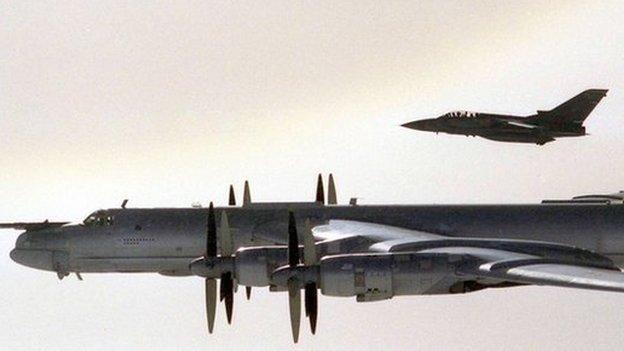
- Published3 September 2014
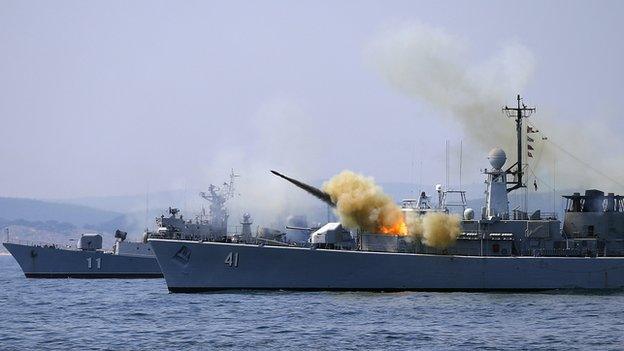
- Published23 October 2014
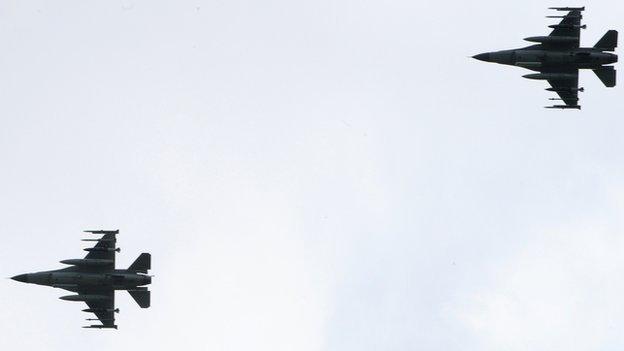
- Published2 April 2014
